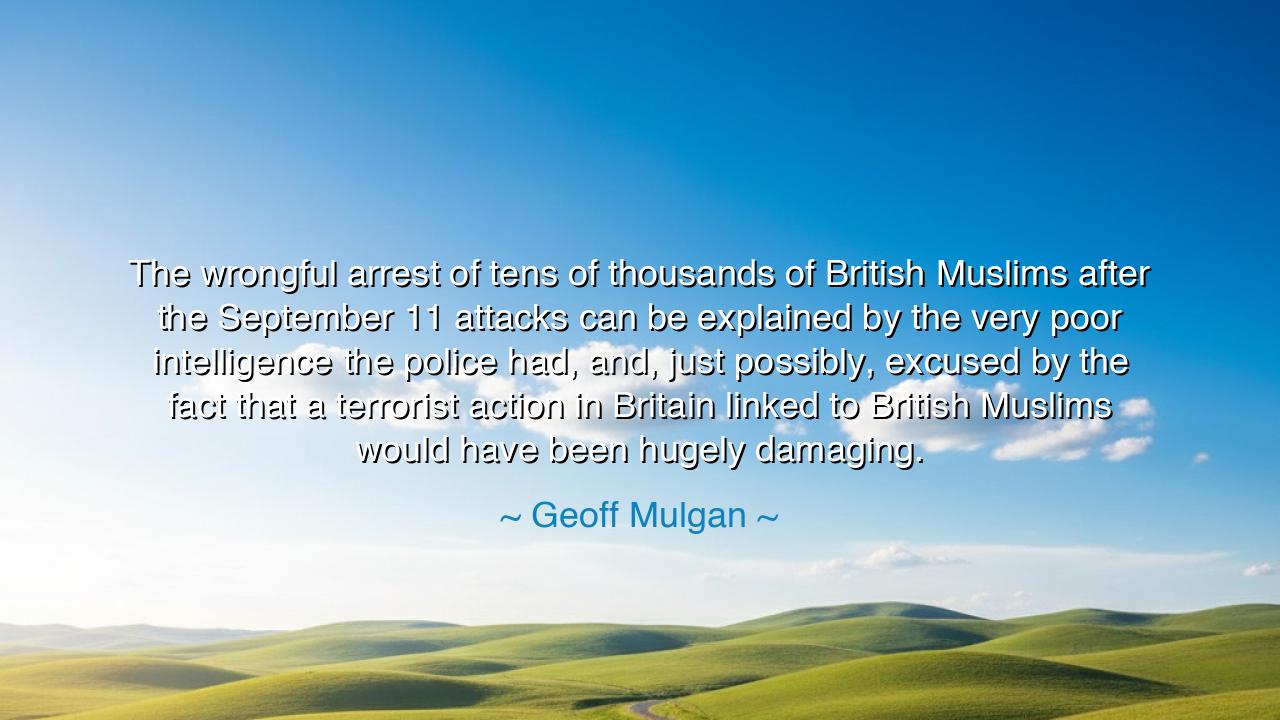
The wrongful arrest of tens of thousands of British Muslims after
The wrongful arrest of tens of thousands of British Muslims after the September 11 attacks can be explained by the very poor intelligence the police had, and, just possibly, excused by the fact that a terrorist action in Britain linked to British Muslims would have been hugely damaging.






The words of Geoff Mulgan echo like a lament through the corridors of history, speaking of the wrongful arrest of tens of thousands of British Muslims after the September 11 attacks. Beneath these words lies not only sorrow, but also a warning — that fear, when untempered by wisdom, can turn even protectors into persecutors. The quote reveals the frailty of human judgment when gripped by terror, and the ease with which justice bends beneath the weight of panic. In the shadow of catastrophe, even noble institutions may falter, and righteousness may be shrouded in suspicion.
When the towers in New York fell, the dust did not settle merely on that city’s skyline — it drifted across oceans and settled upon the hearts of many nations. In Britain, as in many lands, fear grew like a wild fire. The police, ill-equipped with sound intelligence, reached not for truth but for safety. They cast their nets wide, and in doing so, ensnared the innocent along with the guilty. This, Mulgan says, may be “explained” by poor intelligence, but “excused” only by the desperate hope to prevent greater ruin. The word excused here trembles with moral tension — for can injustice ever be forgiven simply because it was born of fear?
In ancient times, the philosopher would remind us: when fear rules, reason sleeps. Think of Rome during the days of conspiracy, when whispers of treason led to the execution of countless innocents. The Senate believed itself righteous, protecting the Republic — yet in their zeal, they planted the seeds of tyranny. So too did Britain, for a moment, mistake vigilance for virtue, and panic for prudence. The spirit of the law — meant to defend — became the weapon that wounded. History repeats this lesson with cruel precision: the mind clouded by terror sees not neighbors, but shadows.
Yet, let us not read Mulgan’s words as condemnation alone, but as a call to understanding. He invites us to see both sides — the fear of devastation that haunted a nation, and the missteps born of ignorance. It is a recognition that even the just may err when blinded by dread. His tone carries the weight of empathy, not vengeance — an elder’s reminder that human frailty, though tragic, is not beyond redemption. The wisdom here is not to deny fear, but to master it; not to shun vigilance, but to pair it with mercy.
Consider the story of Jean Charles de Menezes, the Brazilian man shot in London in 2005, mistaken for a terrorist. His death was not the act of hatred, but of fear — a tragic consequence of haste and misjudgment. His name became a symbol, not of one man’s fate, but of a civilization’s struggle between security and humanity. His story whispers the same truth that Mulgan’s words proclaim: that safety purchased with innocence is a fragile and cursed kind of peace.
The lesson then, my children, is that justice cannot survive in the company of fear alone. The guardian must walk with the sage; the sword must heed the counsel of the heart. When fear arises, remember this — truth is slow, but sure, while panic is swift, but blind. Seek always to understand before you act, to see the human before the threat, and to ask whether your protection serves love or vengeance.
And in our own lives, let us be vigilant not only against the dangers that lurk without, but those that dwell within — prejudice, haste, and the hunger for retribution. When you are wronged, pause before you strike. When you are afraid, question what you see. When you lead, temper your courage with compassion. Thus shall we honor the fallen, and rise above the failings of our age. For only when justice and mercy walk hand in hand shall humanity be truly safe.






AAdministratorAdministrator
Welcome, honored guests. Please leave a comment, we will respond soon